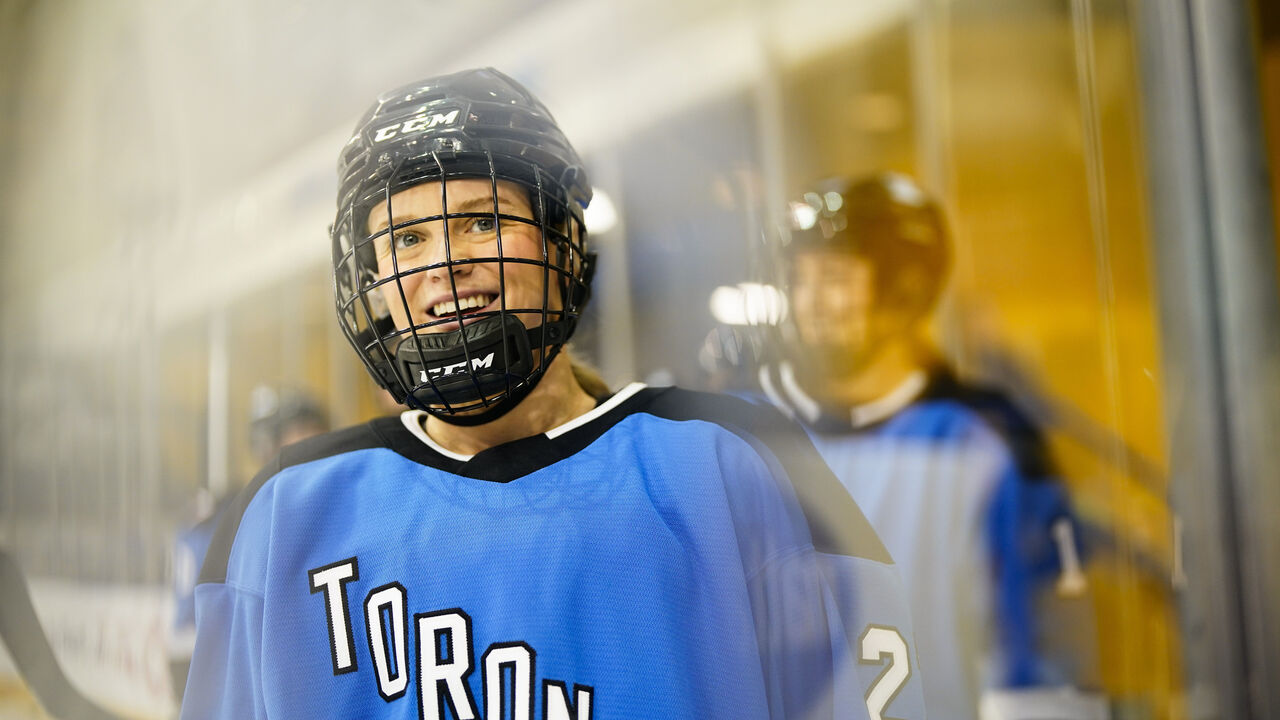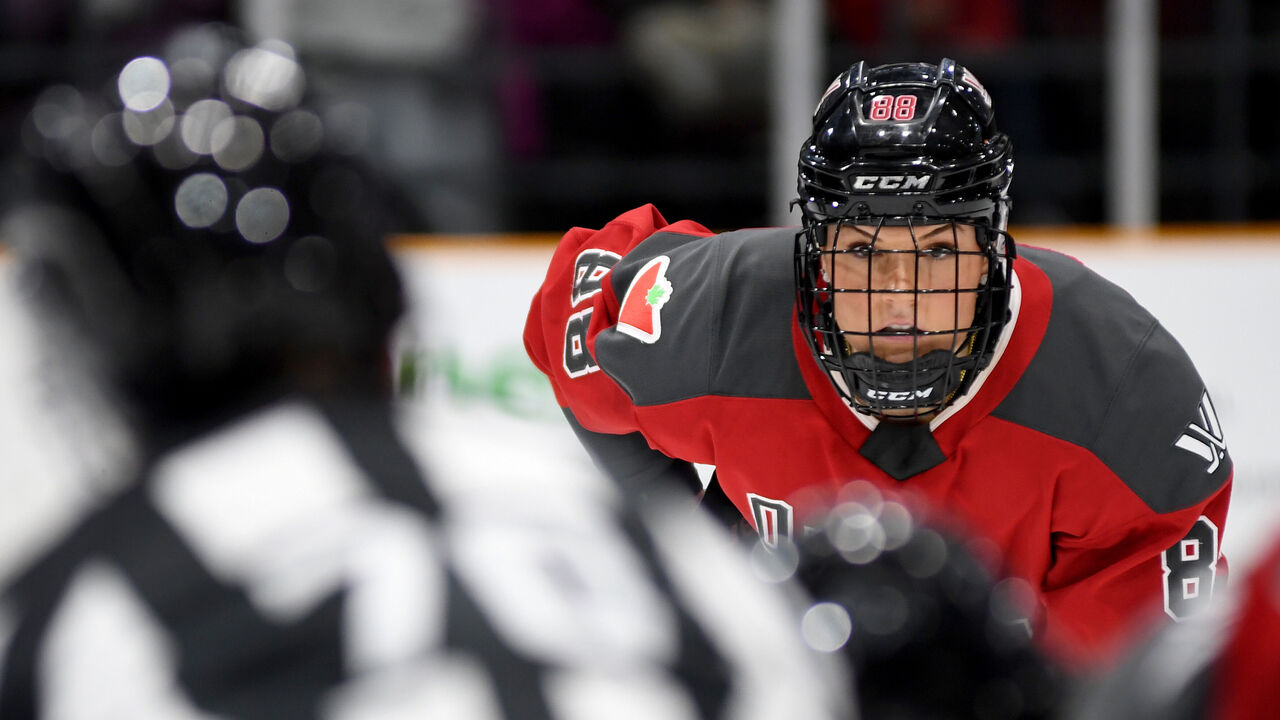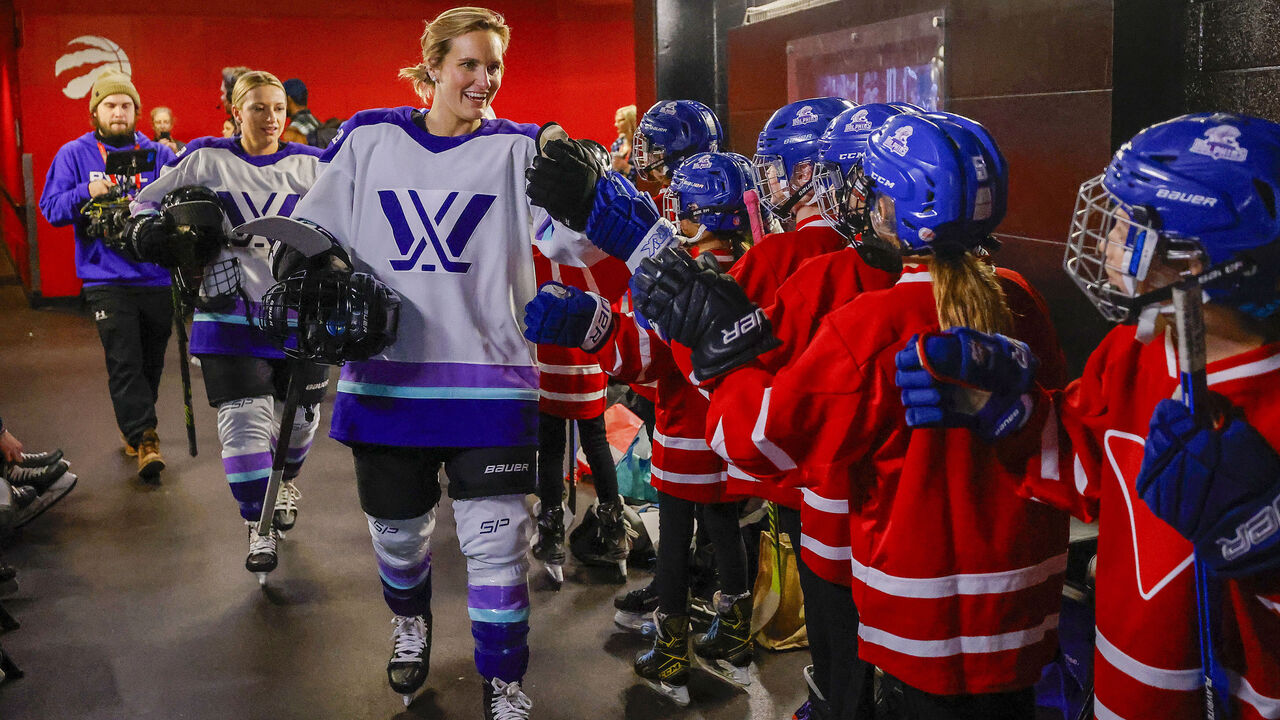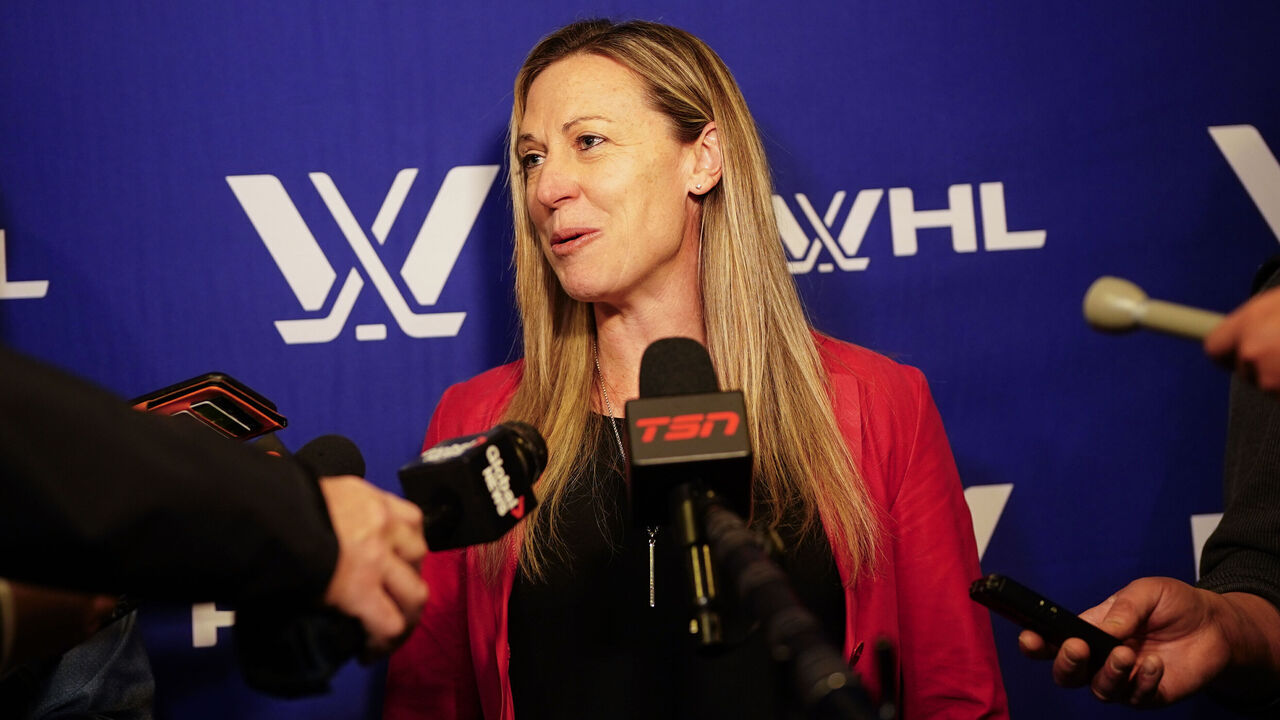The innovative rule that rewards shorthanded goals
TORONTO - In the fourth game in league history, PWHL Toronto defender Olivia Knowles cross-checked a New York opponent in the numbers to clear the crease. A scrum ensued, and the combatants were given offsetting minors while Toronto's Allie Munroe followed them to the box for roughing.
Deployed to kill the penalty, Toronto forward Emma Maltais advanced the puck and beelined to join a two-on-one rush, exposing the power play's flat-footedness. She kept her stick on the ice in case a pass arrived, then buried a rebound. Maltais celebrated as Munroe, suddenly absolved of wrongdoing, left the sin bin.
Emma Maltais scores the first "jailbreak" shorty of @thepwhlofficial! 👊 pic.twitter.com/D8gLqF1tNx
— Sportsnet (@Sportsnet) January 6, 2024
The sequence typified two trends. Physicality is up in the new elite women's pro league because players are empowered to throw hits and toe a line they occasionally cross.
The PWHL also rewards grunt work. Shorthanded goals end two-minute power plays. The innovation incentivizes aggressiveness on the penalty kill and intensifies the momentum swing when those beleaguered units score.
Maltais, a 24-year-old Canadian Olympian, netted the first jailbreak goal on Jan. 5. Five have been tallied through 27 PWHL games. Offense hasn't skyrocketed, but the rule alters how players think and act. Penalty killers hang onto the puck and attempt breakout feeds rather than desperately or instinctively shoveling it down the ice.
"A lot of times on the penalty kill, you try to dump it and get a change," Maltais said. "Now, if you have a chance, why not go for it?"
The jailbreak "adds flavor to the women's game," said PWHL Minnesota forward Grace Zumwinkle, an American Olympian and fellow power killer who scored in the opening weeks of league play.
"It's not something you see in the NHL. You've still got to kill the penalty, but when you get the opportunities to score, you can try to capitalize," Zumwinkle said. "Newer rules get people excited."
Before the PWHL's New Year's Day debut, the original six squads - Boston, Minnesota, Montreal, New York, Ottawa, and Toronto - participated in an evaluation camp in upstate New York. Testing the jailbreak rule in those preseason scrimmages convinced the league it would spice up power plays without seeming gimmicky.
The stakes - minors expire when either side scores - are codified in the PWHL rule book's 16th subsection. When a grateful teammate is sprung from the penalty box, the sight is unique in the hockey marketplace.
"The hockey ops team wanted to make sure that we were open to change and willing to be creative and innovate a little bit, with the understanding that we can pretty easily make our own rules," Jayna Hefford, the PWHL senior vice president of hockey operations, told theScore in a recent interview.
"I think we all acknowledge that hockey is a fairly traditional game. Change isn't always easy. But this is one (rule) that we felt there was excitement around. We pushed to make sure that we were trying some stuff in this inaugural season."

Sticklers for convention understood the appeal.
"I'm such a traditional thinker for hockey, but I love it because I've always thought that there's opportunity shorthanded," Toronto head coach Troy Ryan said. "Your gritty, hardworking, quick players are often on penalty kills. Power plays have a little swagger. It's not all about working hard. It's about using their skill. Sometimes, you can flip things."
Maltais' goal had that effect. The historic jailbreak snapped a third-period deadlock, ultimately leading to Toronto's first victory.
"It's a big energy boost to the team," Maltais said. "I love penalty killing. I love having that role. It's something the team can bond over and gain energy from. Throughout my career, I've been fortunate to be a fast player, get stick on puck, and be able to block shots. That's how I've earned my role."
Jailbreak breakthroughs
For the PWHL to take shape, another league had to shutter. The PWHL united the sport's star talent by buying out the eight-year-old Premier Hockey Federation, which employed dozens of top American and Canadian pros who aren't part of either national team.
"We have a jailbreak" 👀🚨
— CBC Sports (@cbcsports) January 13, 2024
Taylor Girard scores a short-handed goal for @PWHL_Boston pic.twitter.com/A8wpjfHK4Q
One such forward, PWHL Boston's Taylor Girard, was the PHF's last shorthanded scoring leader. A blocker save on a Montreal odd-man rush set up her first jailbreak strike. Noticing that the lone defender back pinched, Girard hustled to accept a breakaway pass and rippled the twine.
"You're a little more aggressive at certain times to throw the puck out and try to get that breakaway," said Girard, who assisted Hannah Brandt's shorthanded tap-in against Toronto this week. "You're looking for your other winger to fly."
Jailbreak goals punish carelessness and nix various penalties. Girard's snipe offset Emily Brown's roughing minor. Susanna Tapani's tripping infraction against Ottawa was excused when Zumwinkle drove to the net, gained body position, stickhandled from backhand to forehand, and roofed the puck in one assertive, fluid motion.
OMG GRACE ZUMWINKLE 😲@PWHL_Minnesota // #PWHL pic.twitter.com/vweVQn58B8
— Bally Sports North (@BallySportsNOR) January 18, 2024
These efforts have boosted benches in precarious moments. The Girard and Zumwinkle scores helped their teams erase two-goal deficits in the second periods of eventual overtime victories. Ottawa rookie Lexie Adzija iced a home win over Toronto in the final minute by controlling a loose puck and banking it off the boards at the perfect angle.
🚨 Lexie Adzija (2)
— PWHL Ottawa (@PWHL_Ottawa) January 24, 2024
🍎 Ashton Bell
🍏 Aneta Tejralová pic.twitter.com/RN4Vu3jH8k
In most leagues, penalty killing is thankless. Jailbreak opportunities reward a forward's doggedness and smarts.
"Awareness is a big thing on the PK. Not necessarily going 100% every time, but being able to read where players are going to go and having your stick and feet in the right place," said Alex Carpenter, an all-situations center for New York and Team USA. "It's exciting when you're able to go out there and kill off a big penalty for your team."
Patient, synchronized units can turn defense into offense in a flash.
"Teams have sort of done that in the past anyway. Any time you block a shot, you have an opportunity and want to see if you can score," New York coach Howie Draper said. "Power plays, oftentimes, aren't ready for an offensive strike. Sometimes, they're a bit lackadaisical. We're more aware of it now. Teams are playing on their toes."

Four PWHL teams - Boston and Minnesota are the exceptions - have allowed a jailbreak goal. Only Montreal and New York have yet to score while shorthanded. Montreal's punchless power play is 1-for-26 (3.8%) through nine games, reflecting a league-wide struggle.
Ottawa and New York have combined to net 13 of the PWHL's 20 power-play goals. The other four teams are scoring on less than 10% of tries. Compared to the NHL, penalty kills foil more opportunities and account for a greater share of goals scored on special teams.
Power plays take time to gel. New combinations of teammates are adjusting to each other's tendencies and the tactics employed by different PK units.
"Some are a little bit more aggressive up top. Some like to stay in lanes and block shots," said Megan Keller, a Boston defender and power-play quarterback. "It depends on personnel. If some people come out and flush you hard, you try to work it down low and attack from there."
Wariness inspired by the jailbreak could be another inhibitor. PWHL power plays have greater reason to fret about squandering possession or losing a race in the neutral zone.
"When a penalty kill is more aggressive, it puts pressure on the power play to make a play around them," Maltais said. "I definitely see some more caution on the blue line. (Puckhandlers are) playing it more safe. I'm not too sure if it's changed that much. I think if there are more jailbreak goals, it definitely will."
'We're setting a standard'
Embracing the catchword, the PWHL applied in January to trademark "Jailbreak," "PWHL Jailbreak," and "Jailbreak goal." If the rule endures, more leagues or international federations might consider adopting it to juice shorthanded production.
Some NHLers like the concept. At All-Star Weekend in Toronto, theScore asked four forwards who play on the PK about the jailbreak's allure and hypothetical impact.
Robert Thomas, Blues, three shorthanded points this season: "There aren't that many shorthanded goals. A team usually gets, probably, 10-15 a year. I think it's really cool. Obviously, it changes the whole play of the game. That was one of the rules I saw that I really liked. I think penalty kills would be more aggressive, especially early on in the kill. Maybe in the first 45 seconds, you're really trying to score."
Sam Reinhart, Panthers, four shorthanded goals: "I've slowly started to realize this as I've started to kill more: There are opportunities to produce on the penalty kill because a lot of power plays aren't focused on it. You might not be as aware coming back. I've tried to take advantage of that more. But I think that might change the way a power play thinks a little bit, having that rule in place."
Tomas Hertl, Sharks, one goal: "I kind of like the idea. It's something new. It makes sense: they score, you're done, that kind of thing. I would definitely be a little bit more careful (on the PP) … (Your mentality) would change a little bit, but it would be like, don't expect to give up a goal because you're still expecting that, on a power play, you have the extra guy and you should score."
Frank Vatrano, Ducks, three points: "I think the rule's great. I think there have been a lot of rules implemented in the NHL over the years that haven't changed, but the NHL's always open for change, so maybe it's something to look at. I'm open to it, for sure."

To create change in the women's game, the PWHL relaxed the officiating standard. Referees allow body-checking when the hitter intends to play or gain possession of the puck. Defenders throw purposeful, technically sound hits that rattle the boards and fire up fans.
Other key PWHL rules differ from the NHL model. Shootouts last five rounds, and players aren't limited to one shot apiece. Montreal superstar Marie-Philip Poulin scored once on four attempts in the league's only shootout to date.
The PWHL also devalued the loser point, awarding three points in the standings to regulation winners.
"There's a lot of competition for fans' time and money. We had to put a product on the ice that provided great entertainment. Feeling like we had this opportunity to do it a little bit differently was part of the culture that our organization has," Hefford said.
"The idea that a regulation win is worth more than an overtime or shootout win was barely debated within our group. Some of the things came about naturally. We had to push through the resistance to change on a few things."

Unlike past women's leagues, the PWHL attracts impressive crowds. Friday's Montreal-Toronto sellout at Scotiabank Arena, the home of the Maple Leafs, is set to shatter the attendance record that Ottawa (8,318), then Minnesota (13,316) broke in January at their respective home openers. Neutral site games will be played in mid-March at NHL venues in Detroit (Ottawa-Boston is the matchup) and Pittsburgh (Toronto-Montreal).
Novelties like the jailbreak amplify the buzz.
"We're setting a standard with a new rule," Maltais said. "Other leagues are going to look at our rule and see how it changes the game. Potentially moving forward, they can make adjustments, as well. I think it creates viewership and excitement around our game."
The rule changes how Ryan, the Toronto and Canada women's national head coach, strategizes in the PWHL. Depending on the game state and the opponent's proficiency with the puck, he said he's reminded his penalty killers about the upside of going on the attack.
The jailbreak prompts contemplation. A thought occurred to Ryan when a Toronto player was hauled to the ice in an earlier clash with Montreal.
"We scored on the delayed penalty," Ryan said. "I was like: 'Ah, it'd be interesting if we actually got our goal and the power play, if (league officials) want more offense.' If they're listening, they can add that one in, too."
— With files from Jolene Latimer
Nick Faris is a features writer at theScore.
HEADLINES
- Karlsson acknowledges possibility of trade: 'Been through this before'
- Playoff pressure index: 3 teams and 3 players with the most to prove
- Stars' Robertson week-to-week with lower-body injury
- Luka excited for Gobert matchup: 'I like to get a center on me'
- Stanley Cup Playoffs Round 1 watchability rankings